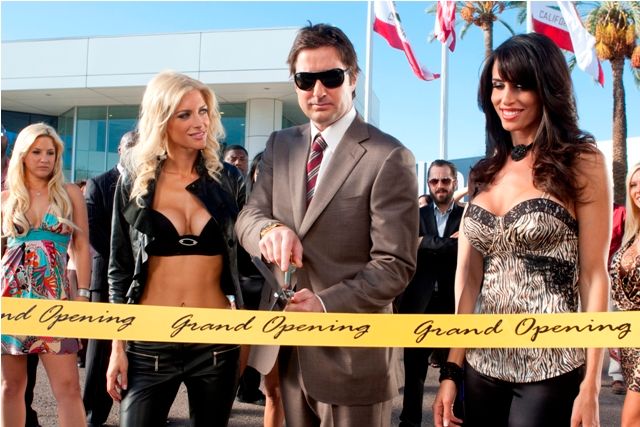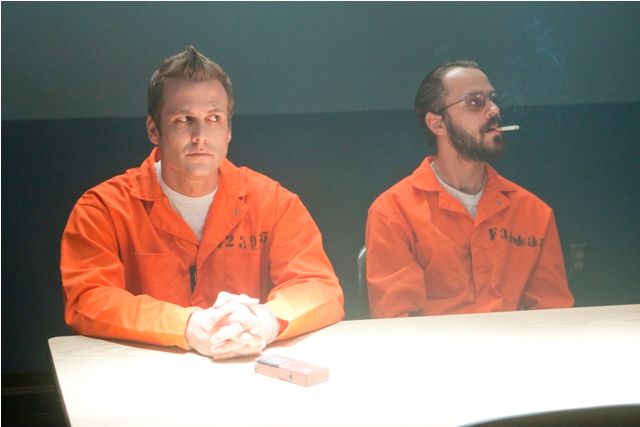As producer Christopher Mallick, on whose experiences "Middle Men" is loosely based, entered the room, the question on everyone's mind was, "Do you owe someone money?" He was wheeled in by a startlingly muscular man packed tightly into a suit, calling to mind events of the film. Was the Russian mob still after the seemingly unassuming businessman turned film producer?
"I owe myself a little more attention to detail," the 51-year-old Mallick explained. "I literally just stepped wrong and then broke my ankle and my knee. I think it's just part of getting old."
Mallick then spoke about how "Middle Men" took shape from anecdotes he shared with writer Andy Weiss ("Punk'd") about the early days of Internet billing. "I used to joke that it's a better movie than it is a business," Mallick said. The producer originally imagined the story as a television series, but Weiss, who was working with co-writer and director George Gallo on another project, saw it as a movie. Six months later the script was done and filming had begun.
"Middle Men," which opens on Friday, follows Jack Harris (Luke Wilson), a legitimate Texas businessman who in 1995 builds the first online billing company dealing exclusively with adult entertainment. He meets up with Wayne Beering (Giovanni Ribisi) and Buck Dolby (Gabriel Macht), a pair of slimy Internet-porn profiteers who lead him from a straight-and-narrow path into a world populated by starlets, con men, FBI agents and Russian mobsters.
Gallo pictured the story as a way to do something unconventional, and one of his guiding principles was to demand that the audience keep up with the story. "If you spoon-feed people slowly they'll get into that rhythm, and if you don't -- if you just start hitting them with stuff -- they'll just stay awake and watch the movie," he said. "'Middle Men' hits the ground with a lot of energy and it never relents."
The film starts at the story's climax, which wasn't something decided in the editing room. "The whole movie to me is funny even though it's dramatic in many ways," Gallo said. "This poor guy walking in the rain putting a suitcase of money in his car because he's gonna go pay off [the mob] -- 'Why am I here? Because I figured out a better way for guys to jerk off.' The idea was yes, this is absolutely horrible, it's terrible and you can laugh at all of this. That's basically what I was trying to say in the first 45 seconds. It's okay to laugh."
Mallick noted that Gallo was adamant the audience knows it's okay to laugh, citing something the director learned during his experience writing "Midnight Run." "It's sort of like making a contract with the audience early on," Gallo explained. "This is what this is gonna be. Not that there won't be surprises, but this is the paradigm we're working in."
Martin Scorsese's "Mean Streets" is a major influence on Gallo as a filmmaker, and "Middle Men" wears that influence proudly."I was always a big Scorsese buff. 'Middle Men' is the kind of movie I've wanted to make for 20 years," he said. "I just got pigeon-holed by studios as a 'comedy guy.' It's hard to make a modern-day, edgy story that's got some sense of gangsters and then to do it without nodding to Scorsese. That's like trying to be an Expressionist and not nodding to Monet. It's just not possible."
Although the story is inspired by actual events, some elements have been fictionalized, and many of the characters, such as the idiot savant-like duo of Wayne and Buck (played by Ribisi and Macht), are composites of several people.
"There were many people involved in [the invention of Internet billing], not just two guys," Mallick explained. "These guys are composites of stories that I told to George and Andy and then their imagination on top of it. I can tell you a story and you might laugh, and it might be funny at a cocktail party, but it ain't a movie. [Gallo and Weiss] took the basics of what people back then were doing -- it was cocaine and rock and roll in your mother's basement, and you never really had made it before. Are you an evil genius, an idiot genius, a savant?"
"Truth is, these guys that created this industry -- in many different places all around the world that have all contributed to this [and to these characters] -- they are like that," Mallick said.
Gallo used a much older reference as his touchstone in creating the characters Wayne and Buck from Mallick's stories. "To me these are like the coked-up version of the Wright brothers," Gallo said. "Two guys that were weird, that were screwing around with wind tunnels and paper airplanes, only these guys are the coked-up version of that with the Internet."
"What is it they say? 'Cocaine and boredom equals invention'?" Mallick quipped. "You got nothing else to do; you're not sleeping."
"It didn't work out that way for me," Gallo replied. "Cocaine plus boredom equaled paranoia."
Mallick praised the actors for what they brought to the characters. "Giovanni and Gabriel took it [further] because George allowed them to. He says something very basic: 'Trust the actors'," Mallick elaborated. "Gabriel is responsible for his entire costume, with Sharon Davis our costume designer. He had a specific idea that was not in the script that this guy is gonna change his look. If you watch the movie, where he starts from brushing his hair to the very end where it's so waxed up that you can't move it -- that was all Gabriel."
"I said to the two guys, 'Some people just aren't meant to have nice things. Just imagine these two guys that are now worth $100 million --what the fuck would you buy?'" Gallo said. "They were so into character, I can't top that."
Casting the roles was liberating in comparison to the typical Hollywood process. Mallick financed the movie himself, which meant the filmmakers were free to cast based on who was right for each part. "We didn't have to go get Will Smith or Tom Cruise, who are great actors that mean something to foreign [sales]," Mallick said. "There are no vampires, there's nothing blowing up -- well, one thing blows up. Nobody has a cape ..."
"Let's make a 'real' movie," Gallo chimed in. "Every choice we make, let's make it for the right reason."
Once the story was figured out, the biggest challenge was making sure they cast a lead who could get away with some of the things main character Jack Harris does and still come across as sympathetic. "We kept talking about that the wrong actor won't be sympathetic in the role," said Gallo. "He does some screwy things ... and he's in a questionable business."
"There's kind of one Luke Wilson out there, for me," Mallick said. "He's very much like Gary Cooper, he's very much like Steve McQueen in some ways. He's a great actor, and we're from the same part of the country -- we're both from Dallas."
As for Wilson's portrayal of Jack and how it matches up with Mallick, the producer described it as "very close" to his own personality. "There are some artistic liberties that George took with what happened," Mallick said. "I mean, Luke is way cooler than I am. Another interesting thing is Luke gained 25 pounds to play the role. He met me and he was like, 'Well, I'm not a runner, that's for sure.' I think that made [him] more of an everyman. He's not this sleek, movie star [in the movie], and I'm certainly not that guy."
While there are enough stories behind the film's real-life tales to make three movies, Gallo always saw one story at its core. "To me this is like a Greek tragedy," he said. "It's [about] a guy that's just trying to find his way back. That's all he's trying to do; he's trying to find a way out. He made a quick deal with the devil, now he wants to get out and he can't."
"I love stories like that. We all become trapped by our own shit," Gallo continued. "That's all the movie was to me, and that's why I think you can just pile all this stuff on there because it's a very basic, simple notion that holds it all together. 'I want to find my way back home.'"


